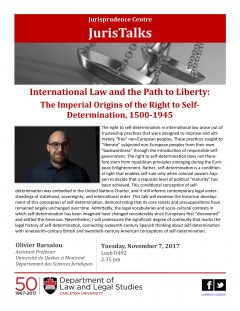JurisTalk | Nov 7th – Prof. Olivier Barsalou – International Law and the Path to Liberty: The Imperial Origins of the Right to Self-Determination, 1500-1945
with Olivier Barsalou, Assistant Professor Université du Québec à Montréal Département des Sciences Juridiques.
Description:The right to self-determination in international law arose out of trusteeship practices that were designed to improve and ultimately “free” non-European peoples. These practices sought to “liberate” subjected non-European peoples from their own “backwardness” through the introduction of responsible self-government. The right to self-determination does not therefore stem from republican principles emerging during the European Enlightenment. Rather, self-determination is a conditional right that enables self-rule only when colonial powers happen to decide that a requisite level of political “maturity” has been achieved. This conditional conception of self-determination was embodied in the United Nations Charter, and it still informs contemporary legal understandings of statehood, sovereignty, and international order. This talk will examine the historical development of this conception of self-determination, demonstrating that its core tenets and presuppositions have remained largely unchanged over time. Admittedly, the legal vocabularies and socio-cultural contexts in which self-determination has been imagined have changed considerably since Europeans first “discovered” and settled the Americas. Nevertheless, I will underscore the significant degree of continuity that marks the legal history of self-determination, connecting sixteenth-century Spanish thinking about self-determination with nineteenth-century British and twentieth-century American conceptions of self-determination.
Date: November 7, 2017.
Time: 2:35 p.m.
Location: Loeb D492.
